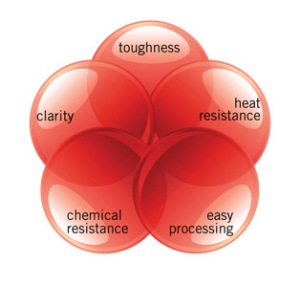Feb 10 2011
Eastman Chemical Company today announced at the Medical Design & Manufacturing West (MD&M West) trade show in Anaheim, Calif., that it is expanding the Eastman Medical Polymers portfolio with the launch of Eastman Tritan™ copolyesters for renal applications.
The family of Eastman Tritan™ copolyesters for renal medical device housings can enhance application performance by providing toughness, chemical resistance and color stability after sterilization. The combination of heat resistance, inherent toughness and sterilization stability renders device housings made with Tritan suitable for gamma, e-beam radiation and ethylene oxide (EtO) sterilization. Tritan offers superior optical clarity after sterilization compared with polycarbonate (PC) and polyolefins, allowing technicians to quickly and easily detect air bubbles, blood leakage or blood clotting.
 Eastman Tritan™ copolyesters properties
Eastman Tritan™ copolyesters properties
The durability of Eastman Tritan™ copolyesters prevents premature cracking or breaking of dialyzer housings, protecting internal membranes and reducing waste due to product failure. Housings molded from Tritan are chemical resistant to avoid environmental stress cracking and withstand exposure to blood, lipids and chemical agents, including isopropyl alcohol, disinfectants and bonding solvents.
"Throughout the past 70 years, Eastman has proven its ability to be a reliable supplier of innovative solutions to meet medical market demands," said Dante Rutstrom, vice president and general manager, specialty plastics business, Eastman. "Eastman Tritan™ copolyesters allow customers to differentiate their brands with materials that offer processing and performance advantages compared with materials currently used for renal applications."
Eastman Tritan™ copolyesters have lower inherent residual stress than polycarbonate (PC), creating the potential for manufacturers to reduce systems costs and save time associated with separate annealing processes. The higher glass transition temperature of Tritan, compared with heritage copolyesters, provides improved processing capabilities as a result of easier release and faster cycle times.
Applications made with Tritan are manufactured without bisphenol A (BPA), ortho-phthalate plasticizers or halogens.
The first acute renal care market manufacturer to utilize Eastman Tritan™ copolyester, the Therapeutic Technologies Group of Minntech Corporation, a Cantel Medical company, announced it is developing the first renal system applications made with Tritan — Hemocor HPH® Hemoconcentrators and Renaflo® II Hemofilters. The Hemocor HPH Hemoconcentrator is a fluid-removal device used in cardio bypass surgery. The Renaflo II Hemofilter is used in intensive care units for treatment of acute renal failure, including fluid removal and kidney stabilization procedures. Both devices will be available following regulatory submission and approval.
Minntech's Therapeutic Technologies Group selected Eastman Tritan™ copolyester for these devices due to the material's secondary operations capacities that allow solvent bonding and the potential to reduce cost and processing time. In addition, it values that the material offers exceptional clarity and is BPA-free. The high-flow attribute of Tritan made it possible for Minntech to utilize existing molds to create the new products.
"It's a priority that individuals in the healthcare industry are confident in the quality and reliability of our products," said Randy Wenthold, vice president, Therapeutic Technologies Group, Minntech. "We believe being among the first to market with these devices featuring the high-quality attributes Eastman Tritan™ copolyester offers is in line with our reputation as an industry leader that provides cutting-edge products."